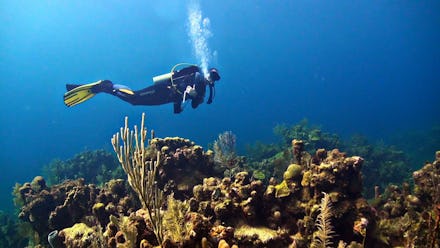Roatán’s divers are protecting their paradise

ROATÁN, Honduras — "Welcome to Paradise! What took you so long?"
That's how the cheerful immigration officer at the airport greets you when you arrive in Roatán. And it doesn't take long for this Caribbean island 40 miles off the northern coast of Honduras to prove that's more than cliché.
With its turquoise and teal waters, hammock-strung palms and chill vibes, Roatán has all the trappings of paradise. It's also located off the Mesoamerican Barrier Reef System, home of the second-largest barrier reef in the world. And with more than a million travelers venturing to the island each year to explore the wonders of the marine world, Roatán's diving community is committed to protecting its underwater paradise.
That's the mission of Roatán Marine Park, a community-based, non-profit organization founded in 2005 by a group of concerned dive operators and local businesses. The organization helps to maintain the marine ecosystem through patrols to prevent illegal fishing, programs to limit invasive species like the lionfish, environmental inspections and public education to encourage locals and visitors alike to respect the reef's fragile beauty.
Working with the Coral Reef Alliance, RMP and other local partners managed to secure designation of two reef systems — Cordelia Banks and Capiro Banks — as Sites of Wildlife Importance, ensuring federal protection for more than 800 species of endangered coral. They've also helped to install mooring buoys to prevent dive boats from dropping anchor and damaging the reefs.
Those conservation efforts are further promoted by local dive shops like Coconut Tree Divers, where we meet Will Welbourn, a dive instructor and our guide to Roatán's reefs. A diver since 1989, he left behind a career in finance in London in 2003 to travel through Central and South America, taking 22 flights in 18 months before settling in Roatán. More than a decade later, he and his wife have made a life here. Standing on the dive shop porch, waiting for his students to get ready for the first dive of what's already a beautiful day, Will smiles and says, "I'm lucky enough to live my life doing what most people daydream about."
Will teaches divers to become both instructors and protectors, so they can lead others on marine excursions while ensuring a future for sustainable marine recreation. Atina from Austria lights up when talking about diving and environmental preservation. Along with Henrik, a former teacher from Sweden, Chantal from the Netherlands, and Rachel from Canada, Atina has already obtained the four previous certificates necessary to be admitted to the course.
After a short ride in our boat, the PotLicker, Will and his students arrive at a respectful proximity to the reef. Flippers, tanks and goggles in place, they descend one by one into the water to explore the reef and learn their part in protecting it.
Reflecting on his good fortune to be living the dream life, Will describes the sense of responsibility he feels for his idyllic island home. "There's not many jobs where you can actually change someone's approach to conservation," he says. "It's when you see the beauty of a reef system that you really do have a take away where you can't help to leave the island feeling that you want to protect that beautiful thing you've seen."
I feel the poignancy of Will's words the next day, as we sit talking with our driver, Henry, and watch the sun fade. Henry's a lifelong islander. His 9-year-old son Enry fishes from a dock nearby. I watch the boy as he sits on the dock post, eyeing the horizon, waiting for the fish to bite. Thanks to the stewardship of divers like Will and the conservationists at the Roatán Marine Park, children like Enry can hope to inherit this paradise and learn to preserve it for generations to come.